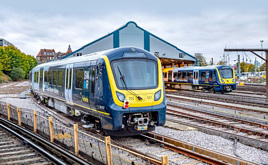Giving evidence to the House of Commons Transport Select Committee on December 6 2023, Alstom UK and Ireland Managing Director Nick Crossfield raised a few eyebrows when he commented that the UK rolling stock market looks “quite attractive” in the medium to long term.
That assessment stands in contrast to the gloomy picture painted by many others in the rolling stock supply industry over the past 12 months.
As the glut of new orders placed in the optimistic pre-pandemic years (worth billions of pounds) reaches its conclusion, production lines in Newton Aycliffe, Derby and Newport face a potentially barren future - as well as job losses that will be devastating for their communities and supply chains.
Since Alstom/Hitachi secured the deal for 54 high-speed trains for HS2 in December 2021, just ten tri-mode inter-city trains (100 vehicles) have been ordered - by LNER, from CAF.
No other new orders have been placed for new passenger trains in the UK since December 2019.
Alstom’s Litchurch Lane plant in Derby has all but completed outstanding orders for ‘Aventra’ electric multiple units for South Western Railway and West Midlands Trains, while Hitachi Rail Europe is finishing off Class 805/807s for Avanti West Coast and Class 810 ‘Aurora’ bi-modes for East Midlands Railway.
In South Wales, CAF Rail UK’s Newport plant is working through an order for Class 197 diesel multiple units for Transport for Wales (TfW), and it will also assemble the 100-vehicle order for LNER by 2027, using components supplied from Spain.
Beyond that, there’s very little in the pipeline to keep thousands of skilled train builders, engineers or their suppliers occupied beyond 2024.
One UK production site potentially affected by the bursting of the rolling stock ‘bubble’ has yet to even roll out its first vehicle.
In its 2024 New Year message, the Railway Industry Association (RIA), the UK rail industry trade body, said: “We’re optimistic about the year ahead. The rail industry is a foundation sector of the UK economy which can boost growth and productivity, as well as enhancing regional connectivity by creating jobs - all of which are crucial priorities in an election year.”
The next government (whoever forms it) will have an unprecedented ‘in tray’ overflowing with demands for more money for the NHS, social care, education, environment, roads, immigration services, defence, and dozens of other departments.
Will transport be willing and able to secure quick support for structural change and investment from the new government?
In the meantime, the UK train building industry faces the prospect of redundancies and factory closures - as well as the loss of key suppliers across the country.
In the worst case, it could leave the UK without the ability to build its own trains, relying instead on factories in Germany, Spain, Switzerland, Italy and Japan.
Many of the UK’s train building facilities, experience and skills were lost in previous cycles of ‘feast and famine’, following the ‘Sprinter’ DMU boom of the late 1980s and the initial rush of new train orders after privatisation in the late 1990s and early 2000s.
In the aftermath of the latter, it became more common for UK trains to be built overseas and imported (primarily from Germany and Spain), owing to the loss of plants such as ABB York and Alstom’s Washwood Heath site in Birmingham.
Without firm commitments from the UK government to back up its ambitions to decarbonise the economy and promote modal shift, the big global train builders are looking to countries where train orders worth billions of pounds continue to be placed.
In other European countries such as Germany, Austria and even France, the pandemic was viewed as an opportunity to accelerate changes to the way people work and travel. Even the USA, where the automobile reigns supreme, is investing hundreds of billions of dollars in new and improved passenger rail links.
The current UK government has instead chosen to focus on car-friendly policies, prioritising the building of new roads and freezing fuel duty since 2011 (actually cutting it by 5p per litre in 2022) - at an estimated cost of £100bn in lost tax revenues to HM Treasury, according to think tank The Social Market Fundation.
However, if Labour forms the next government, rail could become a useful tool to help it establish its ‘green’ credentials, support the UK’s industrial capacity, create high-quality jobs, and provide a catalyst for genuine ‘levelling up’ policies that will create growth outside London and England’s South East.
Life extension
Refurbishing existing trains is a highly specialist activity. And once experienced engineers are lost to the industry, the skills are difficult to recover.
With many older trains being withdrawn to cut costs, work will be harder to find as new trains require less maintenance and mid-life overhauls are still a long way off for many fleets.
However, although there could be some reduction in capacity, there is likely to be an ongoing need for facilities able to undertake heavy overhaul and refurbishment programmes on behalf of rolling stock owners.
Wabtec closed its Brush Works in Loughborough in 2022 due to a lack of work, although part of the site has been taken over by UK Rail Leasing for the overhaul and maintenance of ex-BR diesel locomotives - including GBRf Class 66s and ‘73s’.
Although the outlook for Britain’s railways is still shrouded in uncertainty, significant investment in new rolling stock will be needed soon if the UK is to replace ageing fleets.
If it is to get anywhere near its decarbonisation targets by 2050, many more new electric and hybrid trains will need to be procured before the end of this decade and on into the 2030s.
This article is part of a bigger insight feature in RAIL 1005. Get your copy delivered to your letterbox or inbox.
















Login to comment
Comments
No comments have been made yet.